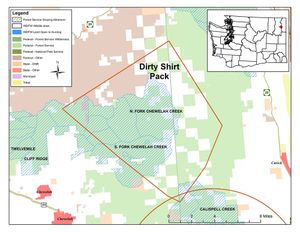Wolf pack closely watched after surrounding rural couple’s dog
ENDANGERED SPECIES -- A northeastern Washington wolf pack is under scrutiny after rural residents fired shots to scare at least five wolves away from a confrontation with their two dogs.
"We’re taking this incident very seriously," said Donny Martorello, who heads the Washington Fish and Wildlife Department's wolf recovery program.
On Monday, Jan. 25, the pack of wolves confronted dogs near the home of a family northeast of Chewelah off Burnt Valley Road.
At dusk, the Stevens County residents were alarmed to see wolves in a field approaching their female Great Pyrenees, Martorello said.
The man got his rifle as the wolves surrounded the dog. The wolves were posturing and jumping and his German shepherd-mix was approaching the group.
Martorello said the man fired "two or three shots" over the heads of the wolves and dogs as his wife reported the incident to the Stevens County Sheriff.
"At that point, the wolves moved away from the house and the dogs went inside," Martorello said. "There was a drop of blood at the site of the incident, but the owners did not find any injuries on the dogs.
"Fortunately, the dog owner did everything right in harassing the wolves out of the area, and the couple has been working with our staff to ensure their animals’ safety and avoid further conflict with the wolves," he said.
Wolves are protected in Washington by state endangered species laws. Federal protections also apply to wolves in the western third of the state.
However, given the imminent threat to the dogs, the owners had the right to shoot one of the wolves in this situation, even though they didn't, Martorello said.
The incident occurred in the range of the Dirty Shirt wolf pack, which was involved in attacks on four cattle last year.
Department staff noted the pack had at least six adults and two pups in early July after confirming the wolves had killed four cattle in at least two separate attacks on a national forest grazing allotment.
One Dirty Shirt wolf wears a GPS collar that helps state biologists monitor the pack's movements.
State law spells out that people have the authority to kill "one wolf" without a permit or prior notification to Fish and Wildlife officials to address a wolf attack on domestic animals.
"The word 'attack' is not defined," Martorello said. "We go by the dictionary definition of physical contact or imminent nature of physical contact."
"People always have the right to protect their personal safety against wolves or any protected species," he said, noting there's legal cushion around the restriction to killing only "one wolf."
People are required to report any injury or lethal action taken against protected species.
Martorello said it was typical that the wolves left the scene when shots were fired even though none was killed.

